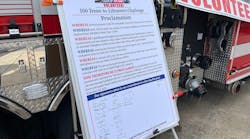A performance evaluation is an excellent tool for helping an employee develop a plan to improve their knowledge, skills and abilities and increase their value to the organization. Another excellent tool is used in many departments on a daily basis but is often overlooked in succession planning, and that is riding out-of-rank.
A performance evaluation is an excellent tool for helping an employee develop a plan to improve their knowledge, skills and abilities and increase their value to the organization. Some performance evaluations are perfunctory, which is a disservice to the employee and represents a failure on the part of the supervisor. In a good performance evaluation, the supervisor and employee will create an individual professional development plan. This plan will help the employee identify and develop their core competencies, the one or two things they do best. The plan should also focus on developing technical competencies, such as EMS skills or fire suppression skills, generic competencies, such as written and oral communication skills, and conceptual competencies, such as the ability to see the organization as a whole and how local, political and financial forces affect the organization. As the employee advances in responsibility and rank, the focus should shift with less emphasis on technical and generic competencies and more emphasis on conceptual competencies and leadership development.
Another excellent tool is used in many departments on a daily basis but is often overlooked in succession planning, and that is riding out-of-rank. Departments ride suppression personnel out-of-rank to help them gain valuable knowledge and experience. Consider riding a potential leader out-of-rank by giving them an "internal internship" to help expand their knowledge, skills and abilities and acquire the tacit knowledge that is a key to success. Tacit knowledge is what you know about the fire service, leadership, etc. but cannot put into words. For the intern, the benefits of traditional internships include training, mentoring, work experience, networking opportunities, and a verbal or written letter of reference. An internal internship will provide these same benefits to the employee, with the ability to add the internship to their r





